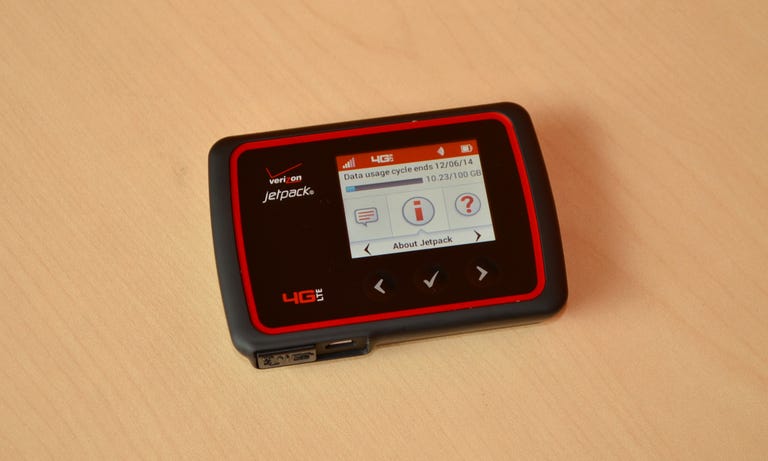 Why You Can Trust CNET
Why You Can Trust CNET Verizon Jetpack MiFi 6620L review: An excellent LTE mobile hotspot and juice pack combo
Looking for a fast mobile hotspot and also in need of a juice pack? The Verizon Jetpack MiFi 6620L is what you're looking for. Here's CNET's full review.
Verizon's Jetpack MiFi 6620L is very similar to T-Mobile's Samsung HotSport Pro that I reviewed a year ago -- but it's better in every way.
The Good
The Bad
The Bottom Line
While both can also work as a juice pack, Big Red's mobile hotspot has a much higher capacity battery and supports more concurrent Wi-Fi clients -- 15 in total. On top of that, it's unlocked and very compact. In testing around the San Francisco Bay Area, the MiFi 6620L performed very well, with excellent 4G LTE Internet speed.
But all of that comes at a high price. The Jetpack costs $200, or $50 if you're willing to sign up for a two-year contract. After that, data plans start at $30 per month, for 4GB of data, all the way up to a staggering $710 per month for 100GB.
That said, if you're looking for a capable mobile hotspot that likely won't run out of battery on a camping trip, the Jetpack MiFi 6620L is an excellent choice. If you prefer another carrier, check out CNET's roundup of the top mobile hotspots on the market.
The Jetpack MiFi 6620L's LCD comes in handy when you need to check its staus and change its settings.
Compact and simple design
Looking from the top, the MiFi 6620L is very compact, just slightly larger than a credit card. From the side, however, the device is quite thick at 0.76 inch. That girth is due to the very high capacity 4,000 mAh Li-Ion battery on the inside. To put this in perspective, the iPhone 6's battery is just slightly more than 1,800 mAh.
On one side, there's a Micro-USB B-female port (for charging the hotspot) and another USB A-female port for powering a mobile device, such as a phone or a tablet. Note, however, that a sliding door between these two USB ports means that you can only use one at a time.
The MiFi 6620L includes a standard USB charger, but you can also charge it via a computer's USB port. When connected to a computer, you also have the option to use the hotspot as the computer's modem. Even more handy, it can operate as a tethered modem and a mobile hotspot at the same time.
On the other side, there's a port for external antenna (not included and only necessary in places with low cell reception) and a power button.
The underside of the MiFi also works as the battery bay's cover, which you can access easily to remove the battery. Beneath the battery is the SIM-card slot. The MiFi 6620L uses a nano-SIM, similar to those used the iPhone 5 or later. Unlike the case of the Samsung Hotspot Pro, the MiFi doesn't have an microSD-card slot. To make up for this, Verizon includes 25GB of online storage with the device, for as long as you use one of its More Everything data plans.
Verizon Jetpack MiFi 6620L specs
| Weight | 4.74 oz. |
|---|---|
| Dimensions (inches) | 2.6 x 3.7 x 0.76 |
| Cellular | LTE Band 13/4 (700/1700 MHz), CDMA/1xEVDO Rev. A (800/1900 MHz); Global Network: EDGE/GSM (850/900/1800/1900), HSPA/UMTS(850/900/1900/2100) |
| Wi-Fi | Wi-Fi 2.4GHz/5.0GHz a/b/g/n |
| Clients supported | 15 concurrent Wi-Fi clients |
| GPS | Yes |
| SIM type | Nano SIM |
| Locked | No |
| Cost | $200 or $50 with a 2-year contract |
| Monthly data cap and cost | 4GB, 6GB, 8GB, 10GB, 12GB, 14GB, 16GB, 18GB, 20GB, 30GB, 40GB, 50GB, 60GB, 80GB and 100GB for $30, $40, $50, $60, $70, $80, $90, $100, $110, $185, $260, $335, $410, $560 and $710 respectively. |
Helpful LCD screen, great feature set
The MiFi 6620L is super easy to use; all you have to do is turn it on. Its handy LCD screen comes with three navigation buttons for you to change the settings and view the status of the mobile hotspot. You can also quickly find out its current Wi-Fi network's name and password for client hookups.
The screen also displays an alert each time a new client connects to its Wi-Fi network. And each time you plug the MiFi into a computer via USB, the screen will ask whether you want to use it as a tether modem, or only for charging. You then can use the navigation button to decide one way or the other.
If you want to change more in-depth settings or access other features of the MiFi, you'll need to use its Web interface. From a connected computer just point the browser to 192.168.1.1 and login with the default admin password, which is the same as the default Wi-Fi password.
The Jetpack MiFi 6620L includes a helpful GPS feature.
The MiFi comes with a terrific set of features for such a small device. There's a simple parental control that allows for putting certain sites on blocked or allowed lists. After that you can select which connected clients are applied to which lists.
Another great feature is the built-in GPS, which supports the NMEA GPS-over-Wi-Fi standard. Supported Wi-Fi clients can automatically use the MiFi's GPS feature. Other devices, such as a computer, can use this feature by using a downloadable bit of software. In my trial, the GPS features worked well, but only out in the open. As you would expect of something that talks directly to satellites, it was never able to find a GPS signal inside buildings.
Other than that, the MiFi includes common settings found in many home routers, such as port forwarding, port filtering, MAC filtering, support for IPv6, a firewall and so on. Interestingly, however, it doesn't allow for IP address reservation, where you can make a client always connect with the same IP address. This means you might need to change the settings of related features, such as port forwarding, once the IP is changed.
As a cellular device, the MiFi is unlocked and will accept SIM cards from other carriers. You will likely need to change the cellular settings before the device can connect to their networks, however. Technically, it supports all cellular standards in the world.
Similar to the Samsung Hotsport Pro, the Jetpack MiFi 6620L supports selective dual-band Wi-Fi. This means its Wi-Fi network can operate in either 2.4GHz frequency band or 5GHz band at a time.
With two USB ports, the Jetpack MiFi 6620L can charge itself or charge another mobile device at a time.
Great performance and battery life, but no unlimited data plan
Like most mobile hotspots on the market, the MiFi 6620L doesn't come with an unlimited data plan. Instead you need to choose one of Verizon's 15 data plans, which start at $30 per month for 4GB, going up to 100GB per month for $710. If you want to opt for a More Everything plan, that'd cost you another $20 per month.
More Everything is only applicable if you also have a Verizon cell phone. It gives you unlimited talk and texts, and you can share the data cap can with up to 10 cellular devices. On top of that, you'll also get 25GB of storage with VZ Cloud, unlimited international messaging and up to $25 discount on Edge, in case you travel to places with no 4G LTE coverage.
Just be aware that using the MiFi 6620L can cost a lot of money. And you can thank the device's fast performance for that. In my testing around the San Francisco Bay Area, the device delivered blazing-fast download speeds that ranged between around 10Mbps to around 40Mbps. At those speeds, you can burn through 4GB of data in just less than an hour. Once you reach the cap, of course, you'll have to pay somewhere between $10 to $15 for each additional gigabyte, depending on the plan you sign up for.
Fortunately, the MiFi 6620L has excellent battery life. I took it out for a weekend trip using it regularly with three devices, and it lasted the entire time without being charged. As a juice pack, the device was able to charge an iPhone 6 from empty to full and still had some 50 percent left. I also love that I can use it as a juice pack and a mobile hotspot at the same time. What's more, it will stop charging a connected device when its power level reaches 25 percent.
Conclusion
Verizon's Jetpack MiFi 6620L easily replaces the Samsung HotSpot Pro as my favorite mobile hotspot. It's excellent in almost all respects, including stellar battery life, superfast cellular speed and great features. And the fact it's unlocked is also a great bonus for international travelers.
Whether or not this is a device for you depends on whether you live within Verizon's 4G LTE coverage, and then if you can afford its data plans. If you do, and can, then the Jetpack MiFi 6620L is easily one of the best mobile hotspot on the market.



